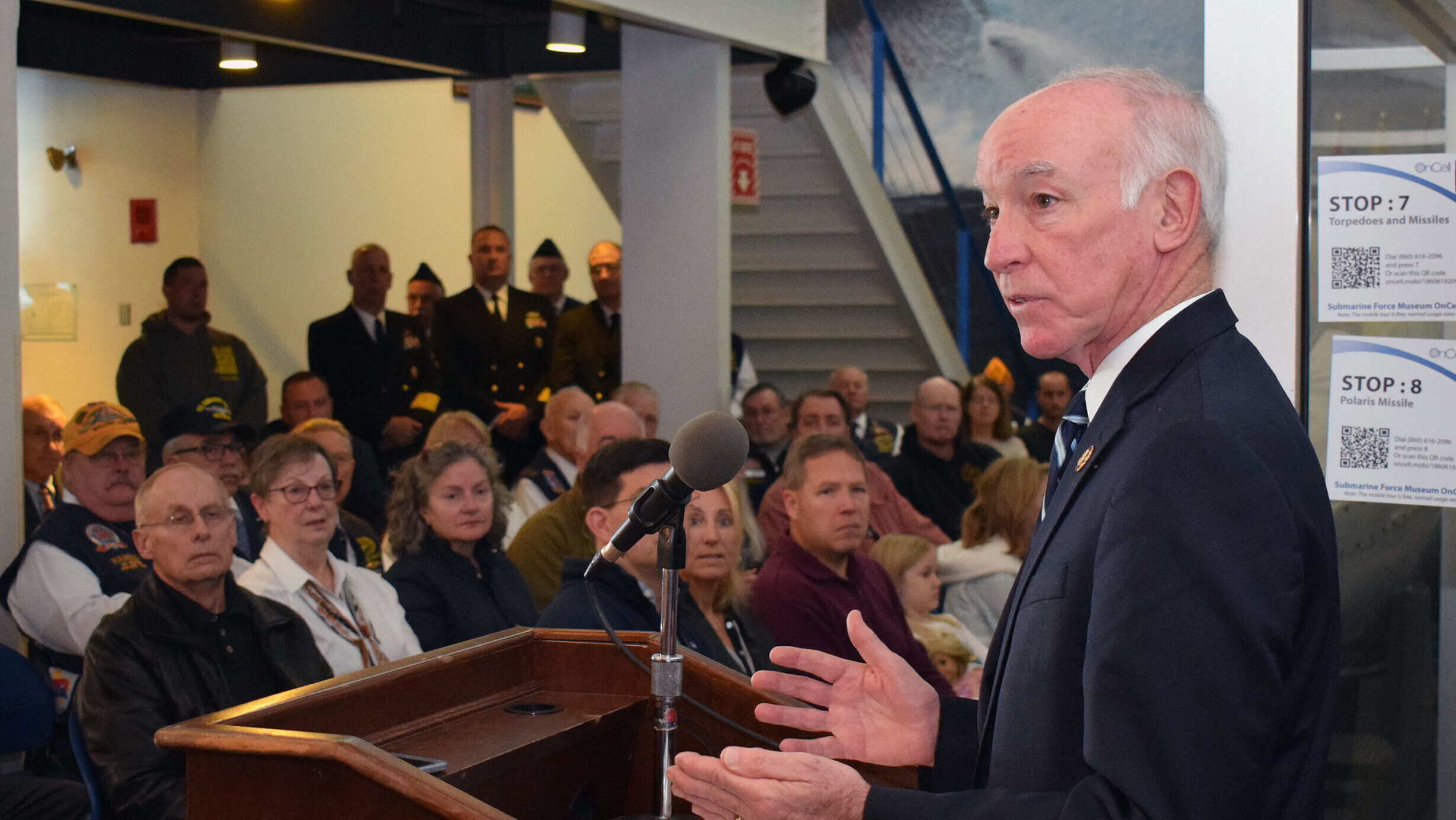
Rep. Joe Courtney, D-Conn., speaks at the United States Submarine Force Library and Museum. Courtney has been one of several lawmakers in recent years publicly advocating the United States ratify the United Nations Conventions on the Law of the Sea. (U.S. Navy photo by Mass Communication Specialist 3rd Class Tristan B. Lotz/Released)
WASHINGTON: A group of Democratic congressmen is renewing a legislative fight to push the United States to ratify the United Nations Convention on the Law of the Sea, an international agreement the country has long resisted despite helping to craft it.
An amendment for a “sense of Congress” asserting that it’s in the country’s best interest to formally ratify the treaty, also dubbed UNCLOS, was included and passed by the House on Thursday night in the America COMPETES Act, a bill aimed at boosting American manufacturers’ ability to compete with China. The lower chamber advanced the bill mostly along party lines.
The renewed push comes at a time when the Pentagon, and in particular the Navy, are focusing on countering China by asserting power in the Indo-Pacific.
“In order to equip the United States to fully and credibly assert the rule of law in the maritime domain, particularly in the Indo-Pacific region, it’s time for our nation to finally join 168 countries around the world and ratify UNCLOS,” Rep. Joe Courtney, D-Conn., one of the amendment’s sponsors, said in a written statement following the House vote.
The amendment was also sponsored by Democratic Reps. Ami Bera, Calif., Rick Larsen, Wash., Elaine Luria, Va., Ed Case, Hawaii, and Dereck Kilmer, Wash. Courtney, among other lawmakers, have intermittently made pushes to have the agreement ratified for the past decade, but those efforts ultimately failed to simultaneously gain the necessary support by the sitting president and 67 senators.
UNCLOS is a 1982 treaty that formalizes well-known rules of navigation, governs the use of undersea resources and provides mechanisms for resolving disputes between countries. Despite its large number of signatories and the fact the United States participated in the original negotiations formulating the agreement, the US has never acceded to — or formally ratified — the treaty.
Proponents chiefly argue that ratifying the agreement would give the US more leverage in pressuring other nations to do the same. The US Navy and Coast Guard both already largely follow the rules of navigation the treaty lays out as a matter of service policy.
Proponents also argue that military leadership almost uniformly expresses support for ratification when asked about their positions during confirmation hearings for senior billets. Adm. Christopher Grady, the vice chairman of the Joint Chiefs of Staff, was the latest four-star officer to do as much.
Those who oppose accession say the treaty would forfeit a level of sovereign power on the United States’ part and that the protections UNCLOS offers for utilizing natural resources in the deep seabed could be worked out through direct negotiations with foreign nations. They also take issue with royalties the United States would end up paying to use resources for which the country already has access.
“We simply are not persuaded that decisions by the International Seabed Authority and international tribunals empowered by this treaty will be more favorable to U.S. interests than bilateral negotiations, voluntary arbitration, and other traditional means of resolving maritime issues,” Sen. Rob Portman, R-Ohio, said after becoming a key vote to prevent ratification in 2012.
Opponents also disagree with the premise that the signing the treaty will assist in managing the behaviors of nations such as China.
“[T]he inability to force Chinese compliance despite a dispute tribunal ruling against Chinese claims in the South China Sea only serves to illustrate that international organizations lack the ability and authority to prevent such aggressive acts,” researchers for the Heritage Foundation wrote in a 2018 commentary. “Between friendly and democratic nations, the convention adds nothing. When a great and autocratic power like China is involved, the convention achieves nothing.”
The amendment passed by the House is a “sense of Congress,” a declarative resolution lawmakers use to spotlight issues, but one that has no effect on whether the status quo changes.
To ratify UNCLOS, the treaty would have to gain support from President Joe Biden, a favorable vote out of the Senate Foreign Relations Committee and then 67 votes from the full Senate — a mountainous task given the 50-50 party split in the upper chamber and the large number of higher-profile, more controversial issues dominating Washington.
Still though, the military’s publicly stated focus on China and the Indo-Pacific writ large now appears to be underpinning the renewed charge for the United States to finally affirm the treaty.
“[T]he ratification of the UNCLOS remains a top priority of the United States Navy and the United States Coast Guard, the importance of which was most recently underscored by the strategic challenges the United States faces in the Asia-Pacific, the Arctic, and the Black Sea regions,” according to the amendment.
The House and Senate will now have to resolve their differences between the House’s bill and the Senate’s version, a process that could result in the UNCLOS language being stripped out or altered. But should it pass, given how sporadically UNCLOS is debated in Congress and the non-binding status that a “sense of Congress” has, it’s unclear what effect the amendment will have long term.






















